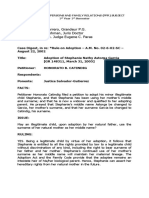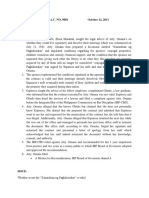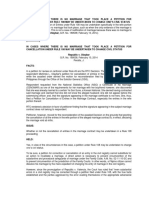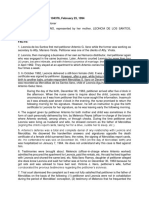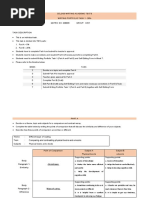Heirs of Fabillar v. Paller
Heirs of Fabillar v. Paller
Uploaded by
Reena AcopCopyright:
Available Formats
Heirs of Fabillar v. Paller
Heirs of Fabillar v. Paller
Uploaded by
Reena AcopOriginal Description:
Copyright
Available Formats
Share this document
Did you find this document useful?
Is this content inappropriate?
Copyright:
Available Formats
Heirs of Fabillar v. Paller
Heirs of Fabillar v. Paller
Uploaded by
Reena AcopCopyright:
Available Formats
HEIRS OF PAULA C.
FABILLAR, as represented by AUREO FABILLAR,
petitioners, vs. MIGUEL M. PALLER, FLORENTINA P. ABAYAN, and DEMETRIA P.
SAGALES, respondents.
[Heirs of Fabillar v. Paller]
G.R. No. 231459
January 21, 2019
J. Perlas-Bernabe, Second Division
Topic: Proof of Filiation
1.Respondents claim that the subject land was a portion of a bigger land originally
owned by Marcelino Paller, their grandfather. His children, Ambrosio, Isidra and
Ignacia, all surnamed Paller inherited the land.
2. Through an oral partition, Respondents’ father, Ambrosio, was given 1 hectare,
Isidra 2 hectares. Isidra’s son sold the lot to Respondent’s mother after Isidra’s
death.
3. Demetria, Ambrocio’s daughter, mortgaged the subject land to Alde with the right
to repurchase. She redeemed the same but discovered that the Custodios took
possession of the land and refused to vacate the same despite demand.
4. Hence, she brought an action for recovery of ownership, possession and damages
against the Sps. Custodio.
5. In their answer, the Custodios claimed to be legitimate and compulsory heirs of
Marcelino who can validly and legally possess the subject land which has not been
partitioned, and thus, commonly owned by his heirs. They further averred that
Ambrosio is not a child of Marcelino and, as such, has no right to claim the subject
land.
6. Respondents presented a baptismal certificate indicating that Marcelino is the
father of Ambrocio and a certain Talampona Duevo was his mother. They also
present an unnotarized deed of sale purportedly covering the sale of the land to
respondents’ mother, Sabina who was described as married to Marcos Paller not
Ambrosio. Respondents explained that "Ambrosio" and "Talampona" are the real
names, and that "Marcos" and "Susana" were mere aliases.
7.MCTC Ruling: Respondents were declared as lawful owners of the land. The RTC
and CA affirmed the ruling on appeal.
Issue: Whether or not the respondents’ predecessor, Ambrosio, is a child of
Marcelino and entitled to inherit the land. NO. The respondents were not able to
prove filiation with competent proof.
1. Although the principal action in this case was for the recovery of ownership and
possession of the subject land, it is necessary to pass upon the relationship of
Ambrosio to Marcelino for the purpose of determining what legal rights he may
have in the subject land which he can pass to his heirs, petitioners herein. Notably,
the issue of whether or not Ambrosio is one of the children of Marcelino was
squarely raised by both parties in their respective pre-trial briefs. Hence, insofar as
the parties in this case are concerned, the trial court is empowered to make a
declaration of heirship, if only to resolve the issue of ownership.
2. Ambrosio's baptismal certificate cannot be considered as competent proof
of the claimed filiation with Marcelino. In the absence of the record of birth and
admission of legitimate filiation, Article 172 of the Family Code (Code) provides that
filiation shall be proved by any other means allowed by the Rules of Court and
special laws. Such other proof of one's filiation may be a baptismal certificate, a
judicial admission, a family Bible in which his name has been entered, common
reputation respecting his pedigree, admission by silence, the testimonies of
witnesses, and other kinds of proof admissible under Rule 130 of the Rules of Court
(Rules). Article 175 of the same Code also allows illegitimate children to establish
their filiation in the same way and on the same evidence as that of legitimate
children.
3. However, it is jurisprudentially settled that a baptismal certificate has evidentiary
value to prove filiation only if considered alongside other evidence of filiation.
Because the putative parent has no hand in the preparation of a baptismal
certificate, the same has scant evidentiary value if taken in isolation; while it may be
considered a public document, "it can only serve as evidence of the administration
of the sacrament on the date specified, but not the veracity of the entries with
respect to the child's paternity." As such, a baptismal certificate alone is not
sufficient to resolve a disputed filiation, and the courts must peruse other pieces of
evidence instead of relying only on a canonical record.
4. In this case, the MCTC, the RTC, and the CA did not appreciate any other material
proof related to the baptismal certificate of Ambrosio that would establish his
filiation with Marcelino, whether as a legitimate or an illegitimate son. Contrary to
the ruling of the said courts, the burden of proof is on respondents to establish their
afirmative allegation that Marcelino is Ambrosio's father, and not for petitioners to
disprove the same, because a baptismal certificate is neither conclusive proof of
filiation /parentage nor of the status of legitimacy or illegitimacy of the person
baptized. Consequently, while petitioners have admitted that Marcelino's heirs had
partitioned Marcelino's properties among them, the Court finds respondents'
evidence to be inadequate to prove the claimed filiation with the property owner,
Marcelino, as to entitle Ambrosio and his successors-in-interest, herein
respondents, to share in the properties left by Marcelino. However, it is well to point
out that the portion of the property supposedly inherited by Ambrosio from
Marcelino involved only a one (1)- hectare portion of the subject land.
You might also like
- LAZATIN V CAMPOSDocument2 pagesLAZATIN V CAMPOSChilzia RojasNo ratings yet
- Virata Vs NG Wee PDFDocument5 pagesVirata Vs NG Wee PDFReena Acop100% (2)
- Topic Workbook - Strategic Leadership - Managing The Strategy Making ProcessDocument17 pagesTopic Workbook - Strategic Leadership - Managing The Strategy Making ProcessziadNo ratings yet
- Liyao Vs LiyaoDocument2 pagesLiyao Vs LiyaoShimi FortunaNo ratings yet
- '015 - Tomlin II Vs Atty Moya Ii - Ac No 6971Document1 page'015 - Tomlin II Vs Atty Moya Ii - Ac No 6971Kyle ReyesNo ratings yet
- 3 Martinez vs. Heirs of Remberto LimDocument2 pages3 Martinez vs. Heirs of Remberto Limmei atienza100% (5)
- Delos Santos Vs VibarDocument2 pagesDelos Santos Vs VibaroabeljeanmoniqueNo ratings yet
- Case Digest PFR Subject Adoption of Stephanie Nathy Astorga Garcia (GR 148311, March 31, 2005)Document1 pageCase Digest PFR Subject Adoption of Stephanie Nathy Astorga Garcia (GR 148311, March 31, 2005)Grandeur P. G. GuerreroNo ratings yet
- Arriola v. People DigestDocument2 pagesArriola v. People DigestDennisOlayresNocomoraNo ratings yet
- BOP Failure Mode Effect Analysis PDFDocument725 pagesBOP Failure Mode Effect Analysis PDFAbd EnnacerNo ratings yet
- Prospectus Next Capital IPO PDFDocument72 pagesProspectus Next Capital IPO PDFMehboobElaheiNo ratings yet
- Recipes - America's Favorite Restaurant Recipes Vol. 2Document363 pagesRecipes - America's Favorite Restaurant Recipes Vol. 2Fide50% (2)
- Audi TT RS Catalogue (UK)Document76 pagesAudi TT RS Catalogue (UK)Fourtitude.comNo ratings yet
- Heirs of Fabillar Vs PallerDocument3 pagesHeirs of Fabillar Vs PallerAnna GuevarraNo ratings yet
- Heirs of Fabillar vs. Paler (Filiation)Document2 pagesHeirs of Fabillar vs. Paler (Filiation)Ariane EspinaNo ratings yet
- Nepomuceno Vs Lopez Case DigestDocument2 pagesNepomuceno Vs Lopez Case DigestCarol Jacinto100% (1)
- Espinosa v. OmanaDocument2 pagesEspinosa v. OmanaMarie Titular100% (5)
- VIRGINIA OCAMPO Vs DEOGRACIO OCAMPODocument1 pageVIRGINIA OCAMPO Vs DEOGRACIO OCAMPOIan CabanaNo ratings yet
- Case StudyDocument1 pageCase StudyJennifer Ando100% (1)
- Ocampo V Ocampo GR 198908Document1 pageOcampo V Ocampo GR 198908Trem GallenteNo ratings yet
- Aguilar Deserve Scant Consideration by This CourtDocument3 pagesAguilar Deserve Scant Consideration by This CourtKORINA NGALOY0% (1)
- Case Digest For Eulogio VS BellDocument3 pagesCase Digest For Eulogio VS BellTiners50% (2)
- Republic v. OlaybarDocument2 pagesRepublic v. OlaybarRenzErwinGozum67% (3)
- Crim Pro Digest Matrido V People GR No. 179061 July 13, 2009Document1 pageCrim Pro Digest Matrido V People GR No. 179061 July 13, 2009inxzNo ratings yet
- SIGA Vs CERCADODocument1 pageSIGA Vs CERCADOMichael James Madrid MalinginNo ratings yet
- Additional Cases - Unlawful Detainer - DONEDocument11 pagesAdditional Cases - Unlawful Detainer - DONEsandovalamber01No ratings yet
- Cruz Et - Al v. Cristobal Et - Al - GR 140422 (2006)Document3 pagesCruz Et - Al v. Cristobal Et - Al - GR 140422 (2006)Nikki Estores GonzalesNo ratings yet
- People v. SaceDocument2 pagesPeople v. SaceKevin KhoNo ratings yet
- In The Matter of The Petition For Habeas Corpus of Potenciano IlusorioDocument2 pagesIn The Matter of The Petition For Habeas Corpus of Potenciano IlusorioIan CabanaNo ratings yet
- Reyes v. MauricioDocument2 pagesReyes v. MauricioChedeng KumaNo ratings yet
- Romero V SingsonDocument1 pageRomero V SingsonAngeliNo ratings yet
- Tambuyat V TambuyatDocument1 pageTambuyat V TambuyatMigs GayaresNo ratings yet
- Dadis v. Sps. de GuzmanDocument5 pagesDadis v. Sps. de GuzmanFranchesca RevelloNo ratings yet
- Estate of Rogelio Ong V DiazDocument2 pagesEstate of Rogelio Ong V Diazleniesorlu100% (1)
- Digest People vs. Mediado - Defense of A RelativeDocument1 pageDigest People vs. Mediado - Defense of A Relativesamcruise_00No ratings yet
- Ilano Vs CADocument3 pagesIlano Vs CATrina RiveraNo ratings yet
- Calimag vs. MacapazDocument3 pagesCalimag vs. MacapazTootsie Guzma100% (2)
- Baranda vs. Baranda DigestDocument2 pagesBaranda vs. Baranda DigestRain Agdeppa CatagueNo ratings yet
- 48 Garcia V Robles Vda de Caparas PDFDocument3 pages48 Garcia V Robles Vda de Caparas PDFYoshimata MakiNo ratings yet
- Campit V Gripa DigestDocument3 pagesCampit V Gripa DigestCharisse ToledoNo ratings yet
- PP v. Palanas - Case DigestDocument2 pagesPP v. Palanas - Case DigestshezeharadeyahoocomNo ratings yet
- Geronimo V SantosDocument2 pagesGeronimo V SantosLee SomarNo ratings yet
- Tribiana Vs TribianaDocument2 pagesTribiana Vs TribianaXyraKrezelGajeteNo ratings yet
- PP v. Pena - Case DigestDocument2 pagesPP v. Pena - Case DigestshezeharadeyahoocomNo ratings yet
- C3h - 7 Jison v. CADocument3 pagesC3h - 7 Jison v. CAAaron AristonNo ratings yet
- People v. Invencion Case Digest ShieDocument4 pagesPeople v. Invencion Case Digest Shielou017100% (1)
- Geronimo v. SantosDocument3 pagesGeronimo v. SantosDanJalbuna100% (2)
- Liyao V Tanhoti-LiyaoDocument2 pagesLiyao V Tanhoti-LiyaoJamiah Obillo HulipasNo ratings yet
- People V MagpayoDocument2 pagesPeople V MagpayoSean GalvezNo ratings yet
- Remrev2 Digest - Abbas V AbbasDocument2 pagesRemrev2 Digest - Abbas V AbbasDrizzyNo ratings yet
- 364-380 in Re Petition of Julian Lin Carulasan WangDocument1 page364-380 in Re Petition of Julian Lin Carulasan WangShimi Fortuna100% (2)
- Republic v. CA (GR 97906) DigestDocument1 pageRepublic v. CA (GR 97906) DigestVielle Ian DiscayaNo ratings yet
- C3h - 3 People v. PalanasDocument2 pagesC3h - 3 People v. PalanasAaron AristonNo ratings yet
- Persons and Family Case Dogest SampleDocument3 pagesPersons and Family Case Dogest SamplePinky Rose Dela CruzNo ratings yet
- Dolores Alejo vs. Spouses Ernesto CortezDocument1 pageDolores Alejo vs. Spouses Ernesto CortezIan CabanaNo ratings yet
- RP Vs CuencaDocument8 pagesRP Vs CuencaAlyssa joy Torio100% (1)
- Babiera v. Catotal - SOBERANODocument1 pageBabiera v. Catotal - SOBERANOVince Llamazares LupangoNo ratings yet
- Jocelyn Sorensen v. Atty. Florito T. PozonDocument1 pageJocelyn Sorensen v. Atty. Florito T. PozonRaineNo ratings yet
- Dela Pena V Avila - PFRS Conjugal PropertyDocument2 pagesDela Pena V Avila - PFRS Conjugal PropertyMichael Lamson Ortiz Luis100% (1)
- In The Matter of Petition For Cancellation of Certificates of Live Birth of Yuhares Jan Barcelote Tinitigan vs. RepublicDocument2 pagesIn The Matter of Petition For Cancellation of Certificates of Live Birth of Yuhares Jan Barcelote Tinitigan vs. RepublicIan Cabana100% (2)
- Geronimo vs. CA & EsmanDocument2 pagesGeronimo vs. CA & EsmanANTHONY SALVADICONo ratings yet
- 7 Wills, Sole Heir Hilario V Miranda, Nov 28, 2018 DIGEST EditedDocument2 pages7 Wills, Sole Heir Hilario V Miranda, Nov 28, 2018 DIGEST EditedAriane EspinaNo ratings yet
- EGUIA - Eulogio v. Paterno Bell Et AlDocument2 pagesEGUIA - Eulogio v. Paterno Bell Et AlJohn Patrick Israel100% (2)
- Marturillas v. PeopleDocument3 pagesMarturillas v. PeopletemporiariNo ratings yet
- Name of The CaseDocument7 pagesName of The CaseNikka Nissa LopezNo ratings yet
- Heirs of Paula C. Fabillar, As Represented by Aureo Fabillar vs. Miguel M. Paller, Florentina P. Abayan, and Demetria P. SagalesDocument7 pagesHeirs of Paula C. Fabillar, As Represented by Aureo Fabillar vs. Miguel M. Paller, Florentina P. Abayan, and Demetria P. SagalesWins BanzNo ratings yet
- 04 Transpo Digests PDFDocument14 pages04 Transpo Digests PDFReena Acop100% (1)
- Sps. Salitico v. Heirs of ResurreccionDocument3 pagesSps. Salitico v. Heirs of ResurreccionReena AcopNo ratings yet
- Mario C. Tan and Erlinda S. Tan, Petitioners vs. United Coconut Planters Bank, RespondentDocument3 pagesMario C. Tan and Erlinda S. Tan, Petitioners vs. United Coconut Planters Bank, RespondentReena AcopNo ratings yet
- Heirs of Asis v. G.G. Sportswear Manufacturing CorporationDocument3 pagesHeirs of Asis v. G.G. Sportswear Manufacturing CorporationReena AcopNo ratings yet
- Shemberg Marketing Corp. v. Citibank, N.A.Document2 pagesShemberg Marketing Corp. v. Citibank, N.A.Reena AcopNo ratings yet
- ANGELITA SIMUNDAC-KEPPEL, Petitioner, vs. GEORG KEPPEL, RespondentDocument4 pagesANGELITA SIMUNDAC-KEPPEL, Petitioner, vs. GEORG KEPPEL, RespondentReena Acop75% (4)
- Hipolito Agustin and Imelda Agustin, Petitioners, v. Romana de Vera, RespondentDocument4 pagesHipolito Agustin and Imelda Agustin, Petitioners, v. Romana de Vera, RespondentReena AcopNo ratings yet
- Saddul v. LoslosoDocument2 pagesSaddul v. LoslosoReena Acop100% (1)
- Zatarain's v. OakDocument3 pagesZatarain's v. OakReena AcopNo ratings yet
- Salvador V PAtriciaDocument2 pagesSalvador V PAtriciaReena AcopNo ratings yet
- Japan GeographyDocument1 pageJapan GeographyReena AcopNo ratings yet
- RP v. MCPSBDocument3 pagesRP v. MCPSBReena AcopNo ratings yet
- Israel Knohl On Hazon GabrielDocument12 pagesIsrael Knohl On Hazon GabrielShalom Hartman Institute100% (1)
- AI-Driven Nutrion Guide Phase IIDocument22 pagesAI-Driven Nutrion Guide Phase IIMuhammad Shahid Maqsood BSCS2021No ratings yet
- Coursefm 1105Document26 pagesCoursefm 1105api-3723125100% (1)
- Domestic Tour ItineraryDocument5 pagesDomestic Tour ItineraryJoyceees VillacruelNo ratings yet
- CanvassDocument1 pageCanvassRene FabriaNo ratings yet
- Lec6 PDFDocument16 pagesLec6 PDFANKUSHNo ratings yet
- Gadus S5 V220 2Document2 pagesGadus S5 V220 2Luqman Cuopreakt'zNo ratings yet
- Comprehensive ReportDocument5 pagesComprehensive ReportHaydee RedobleNo ratings yet
- Laws of SexDocument4 pagesLaws of SexveroegNo ratings yet
- GiraffeDocument16 pagesGiraffeevahhkristinaNo ratings yet
- D102EN Manuale SL FaceDocument40 pagesD102EN Manuale SL FacetechsystemservissNo ratings yet
- Husqvarna/Viking H Class 500E Sewing Machine Instruction ManualDocument60 pagesHusqvarna/Viking H Class 500E Sewing Machine Instruction ManualiliiexpugnansNo ratings yet
- Baya WeaverDocument12 pagesBaya Weaveryashvitalati6349No ratings yet
- IBM Intellistation ManualDocument190 pagesIBM Intellistation ManualPaul NgNo ratings yet
- A Decade of Change in The Seaweed Hydro Colloids IndustryDocument15 pagesA Decade of Change in The Seaweed Hydro Colloids IndustryMissDuckness HalNo ratings yet
- PolypharmacyDocument4 pagesPolypharmacyJeffrey Tan100% (1)
- Safer Smarter Better: Riders, Ridercoaches & TrainingDocument6 pagesSafer Smarter Better: Riders, Ridercoaches & TrainingLovejoy Bermudez QuiambaoNo ratings yet
- Yealink YMS Meeting Server DatasheetDocument3 pagesYealink YMS Meeting Server DatasheetElizabeth ChavezNo ratings yet
- AGM PVS-7 Manual v6 (Approved)Document36 pagesAGM PVS-7 Manual v6 (Approved)inwate1988No ratings yet
- Discourse GrammarDocument47 pagesDiscourse Grammarnaldo RoNo ratings yet
- Food: Where Does It Come From?: Chapter 1 Subject Science Class 6 by Neena MadamDocument12 pagesFood: Where Does It Come From?: Chapter 1 Subject Science Class 6 by Neena MadamNeena MadamNo ratings yet
- Piping MaterialsDocument20 pagesPiping MaterialsTrần Trung DũngNo ratings yet
- New Farsi BookDocument197 pagesNew Farsi Booknegarsh63100% (1)
- Cel2103 Writing Portfolio Task 1 - 30%Document11 pagesCel2103 Writing Portfolio Task 1 - 30%AHMED ALI AHMED / UPM100% (1)
- Fiber Optic Basic Training 2Document51 pagesFiber Optic Basic Training 2Bhegz Escalona100% (1)







